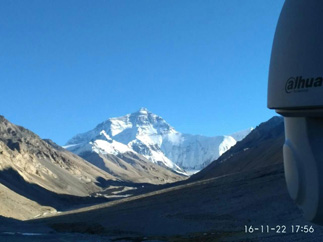As used in 180 countries, Dahua’s products must be able to meet the demands of mountains, deserts, rainforests and coasts. The firm reports that its products have undergone tests to meet standards which in most cases exceed normal industry practice and the datasheet specifications. The purpose is to provide sufficient margins to ensure the product provides reliability in the field.
Dahua video surveillance solutions, such as Smart City and Intelligent Building, are widely applied and may be exposed to physical impact. For example, when installed outdoors, cameras may be hit by a basketball, small stones blown in wind, or scratched by tree branches. Indoor cameras may be damaged by daily use or people intentionally throwing things.
Outdoor cameras have passed the IK10 test (standard IEC62262) in which a steel ball weighing 5kg is dropped from 40cm above generating 20 joules of impact energy on five separated spots on every exposed surface (including three impacts to the lens). For indoor cameras, the test level ranges from IK06 to IK10 (both standard IEC62262), which covers most possible scenarios.
Vibration
In some cases, Dahua cameras are required to work somewhere with high frequency vibration. For instance, near railways, bridges and crosswinds, or construction sites with piling. Dahua cameras, the firm reports, even in extreme circumstances such as car accidents, earthquakes or hurricanes, will remain safely attached to the poles.
All cameras are tested against a frequency of up to 200 Hz with 1G acceleration from X, Y, Z axes for 4.5 hours, to show they can function as usual. When it comes to hanging dome cameras, to make sure they won’t fall down in even some extreme cases, an extra test which triples the vibration rate is conducted whereby Dahua’s cameras can endure several times longer than the standard average.
Temperature
Inevitably, the company’s cameras are sometimes installed in extreme heat or cold, whether factories hot during processing, or chilled-storage warehouses that are maintained cold, or deserts that are hot by day and cold at night. Cold and heat will cause shrinkage, which may very likely to shorten a camera’s lifespan. Besides long hours of use, the cameras are also designed to for long working lifespans against these temperatures, the company says, saving the costs of repairing and replacing. One case as pictured is a Dahua dome camera DHI-SD6AE230F-HNI that operates in view of Mount Everest 5000m above sea level in Qomolangma National Park.
All Dahua cameras have been through low and high temperature continuous operation test for 16 hours (standard IEC62599-1) with spec temperature to guarantee product performance. Besides, all the company’s cameras have gone through intensified HALT (High Accelerated Life Test) and ALT (Accelerated Life Test) tests, to ensure that the cameras can properly work in minus 50 degrees C to 80 degrees C, 10 degrees beyond the standard range (minus 40 degrees to 70 degrees C). This aims to trigger potential product failures from increased extreme environmental stress, helping to locate and improve the weaknesses and identify potential defects of cameras at the earliest possible stage. Three cold starts were required in each of the tests.
For fully enclosed cameras such as PTZ cameras, eyeball cameras, and bullets, alternating temperature and humidity tests (Damp heat cyclic) with temperatures varying between 25 degrees C and 55 degrees C and relative humidity reaching a maximum of 100pc (camera surfaces allow condensation) were conducted for two cycles lasting a total of 48 hours. For cameras not fully enclosed, steady damp-heat tests at 40 degrees C and 93pc humidity (no condensation) were conducted for 96 hours. Both tests have been developed on the basis of international IEC Standards, to show that all cameras are capable of working with the humidity varying from 0pc to 100pc.
In tropical regions such as northeast India, Burma and Sierra Leone, or Asian cities that experience weeklong rains, Dahua cameras are able to resist long periods of waterfall as well as intentional or accidental man-made sprays. Outdoor cameras are required to go through IPX6 or IPX7 tests. A standard IEC62262 IPX6 test requires camera surface to be sprayed by 100±5 L/min of water for 3 minutes. Dahua cameras are tested for at least ten minutes in the same conditions, three times tougher than the standard one. Dahua has developed its own standards which include tests where, 5±0.5 L/min of water (equivalent of middle rain in plum rain season) was sprayed to cameras for 192 hours from above. On top of the water ingress tests, every Dahua camera needs to go through an air-tightness test, too, to make sure that it is water-proof enough.
Corrosion
Dahua’s port and airport solutions require cameras to be installed in seaports and airports where it’s highly likely to be wet and salty. Salt spray and electrochemical effects may result in serious corrosion on metal surfaces, which may cause the fall of the cameras.
Validation
A salt water solution of 5pc NaCl and pH 6.5 to 7.2 was sprayed for two hours, then a 40 degrees C and 93pc damp heat test for 166 hours per cycle for four cycles over a period of 28 days, quadruple the International IEC Standards. It was in an effort to simulate the cyclic salt spray in coastal cities and to identify the likelihood of a camera falling from possible metal corrosion.
Dahua cameras have also passed a drop test that decreases the risks of damage during transport; a life-span test that promises a life of at least four years in normal conditions; and a dust resistance test to show a performance undisturbed by dust.










